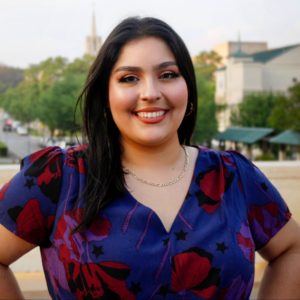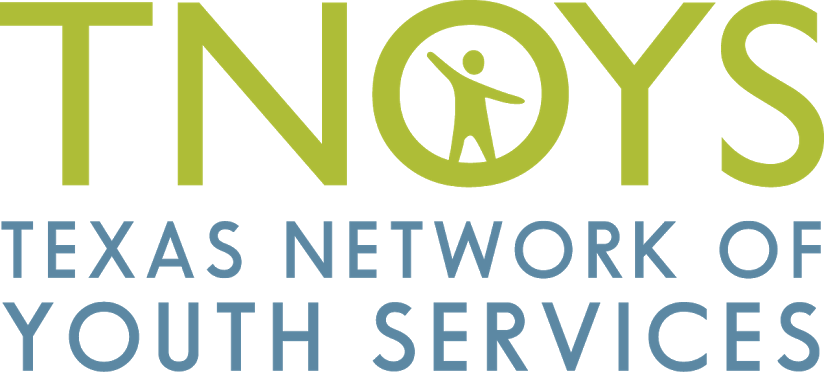From September 15 to October 15, people across the country and beyond are celebrating Latine Heritage Month. Here at TNOYS, we think it is important to recognize this occasion as our state of Texas boasts one of the largest Latine populations in the nation. (Please note: this article uses the term ‘Latine’ as a gender-neutral modifier. Learn more about the term here.)
In order to best serve and elevate the voices of Latine youth, it is important to acknowledge the inequities and disparities that too often lead to overrepresentation in systems for these young people. Data show that in Texas, Hispanic/Latine children make up over one-third of the state’s foster care population despite making up only 22% of Texas’ overall child population (according to research from Texas CASA). Latine youth are also overrepresented among students experiencing homelessness, and make up 52% of opportunity youth despite only making up 46% of the population.

TNOYS believes in the importance of centering diversity, equity, and inclusion, and elevating the voices of Latine youth and young adults in our work to combat these disparities.
We sat down with Partnerships Coordinator Kennedy Huerta Quintanilla to highlight the importance of identity at TNOYS. A recent graduate from University of Texas at Austin, Kennedy is deeply involved in TNOYS’ ongoing work to strengthen partnerships with youth and young adults and center their voices and experiences through listening sessions, storytelling projects, and more.
Read on to learn more about her experience and insights:
Please introduce yourself.
My name is Kennedy Huerta Quintanilla (she/her). I am a 22 year old Texas native, born and raised in Corpus Christi, Texas. I am a recent graduate of the University of Texas at Austin where I graduated with an honors degree in Political Communication. I have been at TNOYS since June, working as the Partnerships Coordinator. I am Mexican-American and am proud to embrace my latinidad.
Tell us more about your role at TNOYS.
As the Partnerships Coordinator, I work under the Partnerships team to build out youth and young adult engagement with TNOYS. I am responsible for managing the Youth Voices Program, which comprises our Storytelling and Listening Session programs, and the P.E.A.K.S Camp, an experiential learning camp for youth in the foster care system. These programs are essential to getting youth stories and opinions heard, as well as providing them an opportunity to grow through positive youth development. I love being able to bridge the gap between systems-involved youth and the adults that are advocating for them through these programs.
What drew you to working with youth and young adults, especially those who have experienced systems involvement? How did you get started in this field?
Growing up in Corpus Christi, I saw the stark reality of inequity from a very young age. Corpus Christi is a predominately middle and low socioeconomic Latine community, with an overwhelmingly white upper class population. When I was an adolescent, my mother got the opportunity to serve in the county juvenile court as a judge. I spent a lot of time in court, seeing firsthand how the justice system impacted youth and their families. I saw that a vast majority of those involved in the system were Latine, disproportionate to the population of the town. I recognized the immense privilege I had as someone who observed the system from the outside and wanted to use this privilege to advocate for these systems-involved youth. My father began working for Court Appointed Special Advocates (CASA) of the Coastal Bend around the same time and I saw my opportunity to make a difference. Even though I was a youth myself, I helped out any way I could: volunteering for fundraising events, helping out around the office, and many other smaller tasks. As I grew up, I wanted to get more seriously involved so I sought out nonprofit work and eventually fell in love with youth engagement through my various roles in college. I am so lucky that I get to continue serving systems-involved youth in Texas through my position here at TNOYS.
How did your identity as a Latine person contribute to your passion for working with young people in Texas?
Understanding and celebrating my Latine identity helped me build upon my passion for youth engagement, especially considering the landscape of the systems in Texas. Like in my hometown, Latine people face systems-involvement at a disproportionate rate, due to structural and systemic biases. Seeing people that looked like me being mainly at the receiving end of the justice system really drove home that these systems were set up to see us fail. I decided that I would fight my very hardest to break into a space where I can show other Latines that it is possible to not only exist in advocacy efforts, but thrive as well.
Does your identity as a Latine person contribute to your role building youth-adult partnerships at TNOYS? If so, how?
My identity as a Latina contributes to everything that I do, especially my work here at TNOYS. Building youth-adult partnership requires youth to feel seen and heard in the advocacy efforts of the issues they face, especially when adults speak on behalf of them. Many of the youth in our network are Latine and come from a distinct cultural background. This informs the way we address programming, unpack trauma responses, and work to advocate for youth facing similar challenges in the system. Understanding and appreciating someone’s culture allows me to better contextualize the problems they face in the system and how their unique perspective can influence how they want to share their story.
Are there other identities that play a role for you, especially in relation to your cultural heritage?
While being Mexican American has been so impactful on my worldview and self-image, specifically being a Latina has impacted me greatly. Latinas face intersectional oppression from being both people of color and women. My mother used to tell me when I was younger that because I am Mexican American, I have to work twice as hard to be half as good as people in positions of power and because I am a woman, I would have to work even harder to be on the same playing field as men. That has been the unfortunate reality for my entire life. I believe that the adversity I have faced has made me more resilient and forced me to turn lemons into lemonade.
In addition to the oppression I have faced from my gender and race, my sexuality has made me contextualize my heritage with my identities. I am a queer Latina. In my youth, I never thought I would be able to proudly embrace all of my identities considering the stigma of queer people in traditional Mexican American culture. I have been so incredibly blessed to have an incredible support system of my family and friends to help me accept my identities for all they are worth. I am unafraid to be myself, all parts of myself included.
What would you recommend to organizations interested in better serving youth & families of Latine heritage?
I would recommend that organizations keep in mind the unique culture of the Latine community when dealing with members of the community. There is so much rich history and tradition that impacts how we think, act and feel oftentimes. It is also important to keep in mind that Latine people are not a monolithic group. The experiences of a Guatemalan-American and a Cuban-American can vastly differ. Lastly, organizations should make space for a representative amount of Latine people on their staff. Over 39% of the Texas population is Latine, so your staff and partners should look like the community you serve. Making these steps can make identifying and assisting Latines in need of care easier.
Keep up with our recognition of Latine Heritage Month by following us on social media (Facebook / Twitter / Instagram / LinkedIn).

So insightful and well-written! Glad you are using your privilege to make others lives better!